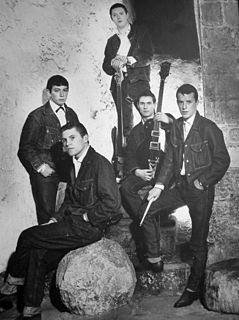
The Animals are an English rhythm and blues and rock band, formed in Newcastle upon Tyne in the early 1960s. The band moved to London upon finding fame in 1964. The Animals were known for their gritty, bluesy sound and deep-voiced frontman Eric Burdon, as exemplified by their signature song and transatlantic No. 1 hit single, "House of the Rising Sun", as well as by hits such as "We Gotta Get Out of This Place", "It's My Life", "Inside Looking Out", "I'm Crying" and "Don't Let Me Be Misunderstood". The band balanced tough, rock-edged pop singles against rhythm and blues-orientated album material and were part of the British Invasion of the US.
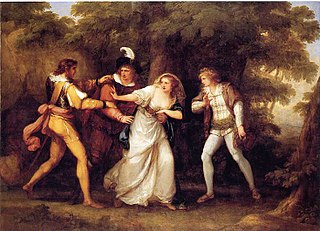
The Two Gentlemen of Verona is a comedy by William Shakespeare, believed to have been written between 1589 and 1593. It is considered by some to be Shakespeare's first play, and is often seen as showing his first tentative steps in laying out some of the themes and motifs with which he would later deal in more detail; for example, it is the first of his plays in which a heroine dresses as a boy. The play deals with the themes of friendship and infidelity, the conflict between friendship and love, and the foolish behaviour of people in love. The highlight of the play is considered by some to be Launce, the clownish servant of Proteus, and his dog Crab, to whom "the most scene-stealing non-speaking role in the canon" has been attributed.
Sherbet was one of the most prominent and successful Australian rock bands of the 1970s. The 'classic line-up' of Daryl Braithwaite on vocals, Tony Mitchell on bass guitar, Garth Porter on keyboards, Alan Sandow on drums, and Clive Shakespeare on guitar provided their teen-oriented pop style. In 1976 Shakespeare left and was soon replaced by Harvey James. Sherbet's biggest singles were "Summer Love" (1975) and "Howzat" (1976), both reaching number one in Australia. "Howzat" was also a top 5 hit in the United Kingdom. The band was less successful in the United States, where "Howzat" peaked at No. 61. As The Sherbs they also reached No. 61 in 1981 with "I Have the Skill". The group disbanded in 1984. Subsequent re-unions have occurred since 1998.

David Thomas Mason is an English singer-songwriter and guitarist from Worcester, who first found fame with the rock band Traffic. Over the course of his career, Mason has played and recorded with many notable pop and rock musicians, including Paul McCartney, George Harrison, the Rolling Stones, Jimi Hendrix, Eric Clapton, Michael Jackson, David Crosby, Graham Nash, Steve Winwood, Fleetwood Mac, Delaney & Bonnie, Leon Russell and Cass Elliot. One of Mason's best known songs is "Feelin' Alright", recorded by Traffic in 1968 and later by many other performers, including Joe Cocker, whose version of the song was a hit in 1969. For Traffic, he also wrote "Hole in My Shoe", a psychedelic pop song that became a hit in its own right. "We Just Disagree", Mason's 1977 solo US hit, written by Jim Krueger, has become a staple of US classic hits and adult contemporary radio playlists.
"Have Yourself a Merry Little Christmas" is a song written in 1943 by Hugh Martin and Ralph Blane and introduced by Judy Garland in the 1944 MGM musical Meet Me in St. Louis. Frank Sinatra later recorded a version with modified lyrics. In 2007, ASCAP ranked it the third most performed Christmas song during the preceding five years that had been written by ASCAP members. In 2004 it finished at No. 76 in AFI's 100 Years...100 Songs rankings of the top tunes in American cinema.
John Maynard La Montaine, also later LaMontaine, was an American pianist and composer, born in Oak Park, Illinois, who won the 1959 Pulitzer Prize for Music for his Piano Concerto No. 1 "In Time of War" (1958), which was premiered by Jorge Bolet.

Honky Tonk Angels is a collaborative studio album by Dolly Parton, Loretta Lynn and Tammy Wynette. It was released on November 2, 1993, by Columbia Records. The album was certified Gold by the RIAA on January 5, 1994, for sales of 500,000 copies.

Two Gentlemen of Verona is a rock musical, with a book by John Guare and Mel Shapiro, lyrics by Guare and music by Galt MacDermot, based on the Shakespeare comedy of the same name.
A part song, part-song or partsong is a form of choral music that consists of a secular song written or arranged for several vocal parts. Part songs are commonly sung by an SATB choir, but sometimes for an all-male or all-female ensemble. This music is usually homophonic, meaning that the highest part carries the melody and the other voices or parts supply the accompanying harmonies, in contrast to songs that are contrapuntal, as are madrigals. Part songs are intended to be sung a cappella, that is without accompaniment, unless an instrumental accompaniment is particularly specified.
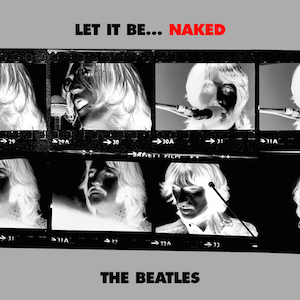
Let It Be... Naked is an alternative mix of the Beatles' 1970 album Let It Be, released on 17 November 2003 by Apple Records. The project was initiated by Paul McCartney, who felt that the original album's producer, Phil Spector, did not capture the group's intended stripped-down aesthetic. Naked consists largely of newly mixed versions of the Let It Be tracks while omitting the excerpts of incidental studio chatter and most of Spector's embellishments. It also omits two tracks from the 1970 release – "Dig It" and "Maggie Mae" – replacing them with "Don't Let Me Down", which was the non-album B-side of the "Get Back" single.
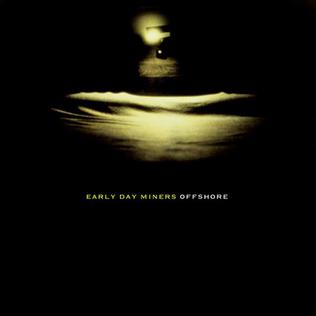
Offshore is the fifth full-length album by Early Day Miners, released in 2006 on Secretly Canadian Records. Offshore is a continuous six-song exploration of the musical and lyrical themes presented in the band's song "Offshore", from their 2002 album Let Us Garlands Bring.

"Get Over It" is a song by the Eagles released as a single after a fourteen-year breakup. It was also the first song written by bandmates Don Henley and Glenn Frey when the band reunited. "Get Over It" was played live for the first time during their Hell Freezes Over tour in 1994. It returned the band to the U.S. Top 40 after a fourteen-year absence, peaking at No. 31 on the Billboard Hot 100 chart. It also hit No. 4 on the Billboard Mainstream Rock Tracks chart. The song was not played live by the Eagles after the "Hell Freezes Over" tour in 1994. It remains the group's last Top 40 hit in the U.S.
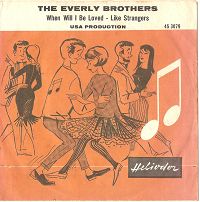
"When Will I Be Loved" is a classic popular song written by Phil Everly of the Everly Brothers, who had a US top-ten hit with it in 1960. Linda Ronstadt covered the song in 1975, and her version was an even bigger hit in the US, peaking at No. 2.
"Get Off Your Ass and Jam" is a song by Funkadelic, track number 6 to their 1975 album Let's Take It to the Stage. It was written by George Clinton, although the lyrics are made up entirely of repetitions of the phrase, "Shit! Goddamn! Get off your ass and jam!", interspersed with lengthy guitar solos. Critic Ned Raggett reviewed the song as one that "kicks in with one bad-ass drum roll and then scorches the damn place down".

As You Like It is a pastoral comedy by William Shakespeare believed to have been written in 1599 and first published in the First Folio in 1623. The play's first performance is uncertain, though a performance at Wilton House in 1603 has been suggested as a possibility.
The Twilight Hours are musicians, as a band, formed by Matt Wilson and John Munson.
Martin Best is an English singer, lutenist, guitarist, and composer. Best has been active mainly in early music including Renaissance music, minstrel songs and the French troubadour traditions, in works related to Shakespeare, such as the sonnets and music to Shakespeare plays, and also in songs of the Swedish ballad tradition. He has often performed in constellations named Martin Best Consort and Martin Best Medieval Ensemble.
"Come Away, Death" is a song by the fool Feste from Shakespeare's Twelfth Night.
Let Us Garlands Bring is a song cycle for baritone and piano composed by Gerald Finzi between 1929 and 1942, and published as his Op. 18. It consists of five settings of songs from plays by William Shakespeare. It was premiered on 12 October 1942 at a National Gallery lunchtime concert in London. That day was the 70th birthday of Ralph Vaughan Williams, and the cycle is dedicated to him. Finzi subsequently arranged the work for baritone and string orchestra.
"An Sylvia", D 891; Op. 106, No. 4, is a Lied for voice and piano composed by Franz Schubert in 1826 and published in 1828. Its text is a German translation by Eduard von Bauernfeld of "Who is Silvia?" from act 4, scene 2, of The Two Gentlemen of Verona by William Shakespeare. "An Sylvia" was composed during a peak in Schubert's career around the time he was writing the Ninth Symphony "Great", two years before his death.









